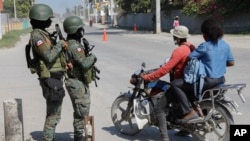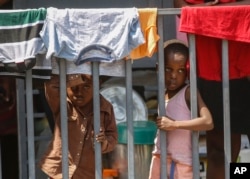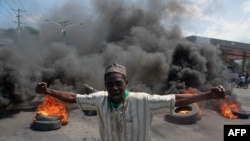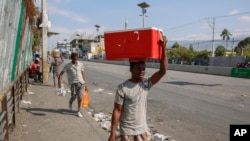Haiti’s opposition and civil society groups are busy negotiating who will represent them on the transitional council to govern violence-plagued Haiti.
The proposal was announced Monday after a seven-hour meeting of Caribbean Community (CARICOM) leaders, Haiti opposition groups, civil society and diaspora representatives in the Jamaican capital, Kingston. The Haitians participated via videoconference, unable to travel because of the closure of Port-au-Prince’s international airport.
Under the plan, six people representing various Haitian political coalitions will be on the transitional council, along with a seventh from the private sector. The seven will be voting members.
There will also be two nonvoting members – one from civil society and one from the interfaith community – according to CARICOM. The council will select an interim prime minister and prepare to hold the next presidential elections.
While some political parties have remained silent about who will represent them, others made announcements on Wednesday.
The Montana Accord group said economist and politician Fritz Alphonse Jean would represent them on the council. The December 21 Accord group proposed former Chamber of Deputies lawmaker Vickerson Garnier.
Meanwhile, the January 30 Collective group was unable to agree on its representative. The EDE, RED and Konpwomi Istorik (Historical Compromise) umbrella group selected Marie Ghislaine Mompremier, Haiti’s minister of women and women’s rights.
Fanmi Lavalas, the party of former President Jean-Bertrand Aristide, said it was still discussing its representative. But Pitit Dessalines, led by ex-Senator Jean Charles Moise, rejected CARICOM’s plan and insisted its three-member transition council plan should be adopted.
The private sector has not publicly said whether it intends to name a representative. However, its members noted the importance of the private and economic sectors’ participation in any plan to move Haiti forward.
The civil society group named Florida resident Pierre Jean Raymond Andre as its member-observer on the council.
State Department spokesman Matthew Miller said early Tuesday afternoon that under the terms of Monday’s agreement, "we expect that the members of the transitional council will be appointed in the next 24 to 48 hours.”
The council will “take the step to appoint an interim prime minister in the near future after that,” Miller said at the daily briefing.
But inside Haiti it was unclear Wednesday whether the transitional council would be operational by Thursday.
VOA asked White House press secretary Karine Jean-Pierre what would happen if the Haitian groups didn't come to an agreement within the 48-hour time frame outlined in the CARICOM plan.
“We will let the Haitian people speak to their efforts and timelines,” Jean-Pierre said. “We remain committed to supporting Haitians and their efforts to create the Transitional Presidential Council to restore security and pave the way to free and fair elections.”
But inside Haiti and in the Haitian diaspora, CARICOM’s plan was not sitting well.
Supporters of rebel leader Guy Philippe, a former senator, took to the streets of Jeremie, in Haiti’s south, to protest the plan.
“It’s time for us to take our destiny in hand!” a female protester who declined to give her name told VOA. “We want Guy Philippe, not CARICOM!”
Philippe led a coup against Aristide in 2004. He ran unsuccessfully for president in 2006, then won a seat in Haiti’s Senate in 2016.
Before his swearing-in ceremony, Philippe was arrested and deported to the United States, where he stood trial and was convicted of money laundering. He returned to Haiti in November 2023 and announced a “peaceful revolution.”
Philippe also formed an alliance with the collective of armed gangs called “Viv Ansanm” that is led by notorious gang leader Jimmy Cherizier, known by his nickname “Barbecue.”
Cherizier has said the gangs back Philippe and will not accept any plan put forth by CARICOM.
While many Haitians support Philippe, he also has numerous political enemies, including current government ministers who are members of Aristide’s Lavalas party.
Philippe is ineligible to serve on the transitional council because he is a convicted felon.
"I think the United States and the vast majority of the international community would find [a Philippe presidency] deeply worrisome, and we would have serious concerns about that,” a senior State Department official said Tuesday.
In Miami, the Haitian diaspora expressed trepidation.
“We don’t need the old rats [longtime politicians] at all,” Sonondieu, a Haitian man shopping at a Little Haiti supermarket, told VOA. “We don’t need old guys, we need new politicians.”
A female customer who declined to give her name criticized CARICOM for taking a lead role in solving Haiti’s political impasse.
“It’s like they sold Haiti, without us even knowing about it,” she said.
There has been a lot of disinformation about Haitian participation in the Kingston meeting on social media as well. Superstar DJ Michael Brun posted a message on X saying, “Haiti – unnamed / unvoiced stakeholders.”
In reality, public statements about finding a solution for Haiti’s problems by the United States, CARICOM, the international community and the United Nations are in alignment with what Haitians say they want for themselves.
“Haitians should be able to choose their leaders and determine their future,” Jean-Pierre said at the White House.
Nonetheless, since President Jovenel Moise’s assassination in July 2021, Haitian stakeholders and political actors have been unable to agree on the way forward.
White House Correspondent Anita Powell and State Department Bureau Chief Nike Ching contributed to this report. Mackenson Charles reported from Jeremie, Haiti; Luckson Saint-Vil reported from Miami.







